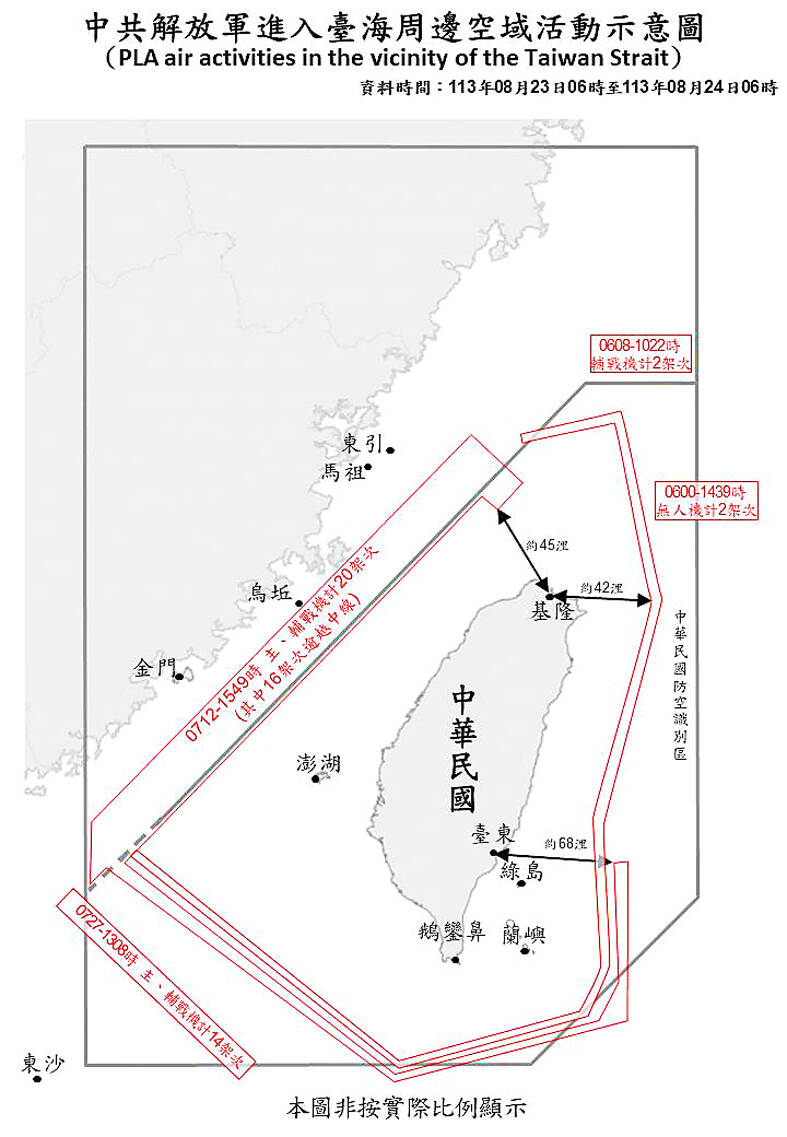China sent 50 military planes and vessels to the vicinity of Taiwan in the 24 hours starting at 6am on Friday, while President William Lai (賴清德) was visiting Kinmen for the first time since taking office in May to mark the 66th anniversary of the 823 Artillery Bombardment.
Flight paths released yesterday by the Ministry of National Defense showed that 38 military aircraft were detected in Taiwan’s air defense identification zone (ADIZ), the highest number recorded in recent weeks.
The figure included 32 that crossed the median line of the Taiwan Strait or its extension.

Photo courtesy of the Ministry of National Defense
Of the Chinese People’s Liberation Army (PLA) aircraft which crossed the extension of the median line, two drones entered the southwestern part of the nation’s ADIZ before flying along its southern, eastern and northern shores, almost circumnavigating Taiwan proper.
In addition, 12 Chinese military vessels were detected in waters around Taiwan during the same 24-hour period, ministry data showed.
Su Tzu-yun (蘇紫雲), a research fellow at the Institute for National Defense and Security Research, said the PLA likely stepped up its activities around Taiwan in response to Lai’s speech in Kinmen, a crucial military outpost, on Friday.
Lai was in Kinmrn to pay his respects to military personnel who died during the 823 Artillery Bombardment.
During his speech, Lai called for the nation to be wary of China’s attempts to annex Taiwan and change the “rules-based” international order not only in the Western Pacific region, but also the
In response to his speech, China’s Taiwan Affairs Office spokesperson Zhu Fenglian (朱鳳蓮) said Lai has “strapped Taiwan on a tank” by attempting to push for Taiwanese independence.
Meanwhile, Su said China was also ramping up pressure on Taiwan to vent its displeasure over a motion passed by the Australian Senate earlier this week that rejected China’s attempts to marginalize Taiwan in the international community by framing UN Resolution 2758 — a motion on China’s representation at the UN — as determining Beijing’s sovereignty over Taiwan.
The motion, passed by a vote by Australian senators, stated that Resolution 2758, passed in 1971, “does not establish the People’s Republic of China’s (PRC) sovereignty over Taiwan and does not determine the future status of Taiwan in the United Nations, nor Taiwanese participation in U.N. agencies or international organizations.”
Beijing was trying to amplify its “political signal” by intensifying drills around Taiwan, Su said.
The 823 Artillery Bombardment, also known as the Second Taiwan Strait Crisis, was a battle in which China fired more than 470,000 shells at Kinmen over 44 days in 1958, although intermittent shelling continued well into 1979.
Although Taiwanese forces successfully defended Kinmen, 618 members of Taiwan’s armed forces and civilians died in the battle, with another 2,610 injured, government statistics showed.

Taiwan’s Liu Ming-i, right, who also goes by the name Ray Liu, poses with a Chinese Taipei flag after winning the gold medal in the men’s physique 170cm competition at the International Fitness and Bodybuilding Federation Asian Championship in Ajman, United Arab Emirates, yesterday.

Costa Rica sent a group of intelligence officials to Taiwan for a short-term training program, the first time the Central American country has done so since the countries ended official diplomatic relations in 2007, a Costa Rican media outlet reported last week. Five officials from the Costa Rican Directorate of Intelligence and Security last month spent 23 days in Taipei undergoing a series of training sessions focused on national security, La Nacion reported on Friday, quoting unnamed sources. The Costa Rican government has not confirmed the report. The Chinese embassy in Costa Rica protested the news, saying in a statement issued the same

A year-long renovation of Taipei’s Bangka Park (艋舺公園) began yesterday, as city workers fenced off the site and cleared out belongings left by homeless residents who had been living there. Despite protests from displaced residents, a city official defended the government’s relocation efforts, saying transitional housing has been offered. The renovation of the park in Taipei’s Wanhua District (萬華), near Longshan Temple (龍山寺), began at 9am yesterday, as about 20 homeless people packed their belongings and left after being asked to move by city personnel. Among them was a 90-year-old woman surnamed Wang (王), who last week said that she had no plans

TO BE APPEALED: The environment ministry said coal reduction goals had to be reached within two months, which was against the principle of legitimate expectation The Taipei High Administrative Court on Thursday ruled in favor of the Taichung Environmental Protection Bureau in its administrative litigation against the Ministry of Environment for the rescission of a NT$18 million fine (US$609,570) imposed by the bureau on the Taichung Power Plant in 2019 for alleged excess coal power generation. The bureau in November 2019 revised what it said was a “slip of the pen” in the text of the operating permit granted to the plant — which is run by Taiwan Power Co (Taipower) — in October 2017. The permit originally read: “reduce coal use by 40 percent from Jan.